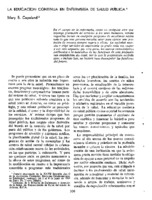Basic malaria microscopy : Part I. Learner's guide : Part II. Tutor's guide
Date
1991Metadata
Show full item recordAbstract
Effective management of malaria relies heavily on accurate and timely diagnosis, which in turn on sufficient numbers of health workers being trained in appropriate microscopy techniques. Recognition of the increasing need for such personnel prompted the publication of this comprehensive, two-part training module on basic malaria microscopy. The module is one of three, each concerned with a different aspect of the fight against malaria, and is intended for use in training courses devoted exclusively to diagnostic microscopy or as part of broader teaching programmes Part I - the Learner's Guide - consists of a series of Learning Units, with clearly stated learning objectives, which take trainees through each step of the diagnostic routine in the correct sequence. Topics covered include preparation of microscope slides, blood sampling, use of the microscope, and indentification of malaria parasites. The information contained in the Learning Units is designed to accompany a programme of lectures, demonstrations, group discussions, field work and - most importantly - practical laboratory work. Its completness is intended to obviate the need for trainees to make more than the briefest notes during the course and to provide them with a valuable reference work in the Guide, which will be of particular assistance in the correct identification of the species and stage of malaria parasite observed in blood samples Part II - the Tutor's Guide - is intended for use by those involved in the organization and administration of a training course. There is extensive advice on selection of learners, course design and timetabling, provision of equipment and facilities, and evaluation - of both the learners and the course itself. Guidance is also provided on the best means of helping learners to achieve the objectives defined in each of the discrete Learning Units that are central to the course. Greatest emphasis is laid on practical work in the laboratory, but suggestions are also made for lecture topics, demonstrations, group discussions and field work. Multiple-choice "quizzes" are an effective and generally popular meansof evaluating learners' progress, and numerous suitable questions and answers are supplied in an annex. Feedback from learners is identified as a means of improving future training, and another annex provides a suitable questionnaire covering all aspects of the course, including the abilities of its organizers
Collections
Full text not available. Please contact PAHO Library using this e-mail for further instructions
Related items
Showing items related by title, author, creator and subject.
-
Pan American Health Organization; Family, Health Promotion and Life Course (FPL); Noncommunicable Diseases and Mental Health (NMH); Centro Latinoamericano de Perinatología, Salud de la Mujer y Reproductiva (CLAP) (PAHOUnited StatesWashington, D.C., 2020)Fetal alcohol spectrum disorders (FASD) represent a range of physical, mental, and behavioral disabilities caused by alcohol use during pregnancy, or prenatal alcohol exposure (PAE). FASDs are considered to be one of the ...
-
Lauria-Horner, Bianca; Knaak, Stephanie; Cayetano, Claudina; Vernon, Andrew; Pietrus, Michael (2023)[ABSTRACT]. Objectives. The aim of this initiative was to assess whether a novel training program – Understanding Stigma and Strengthening Cognitive Behavioral Interpersonal Skills – could improve primary health care ...
-
Copeland, Mary E (s.d.)If nurses are to keept abreast of the medical care and medical aid programs in national, regional or local health institutions and agencies continuing education in health is necessary. It enables them to keep up to date ...



